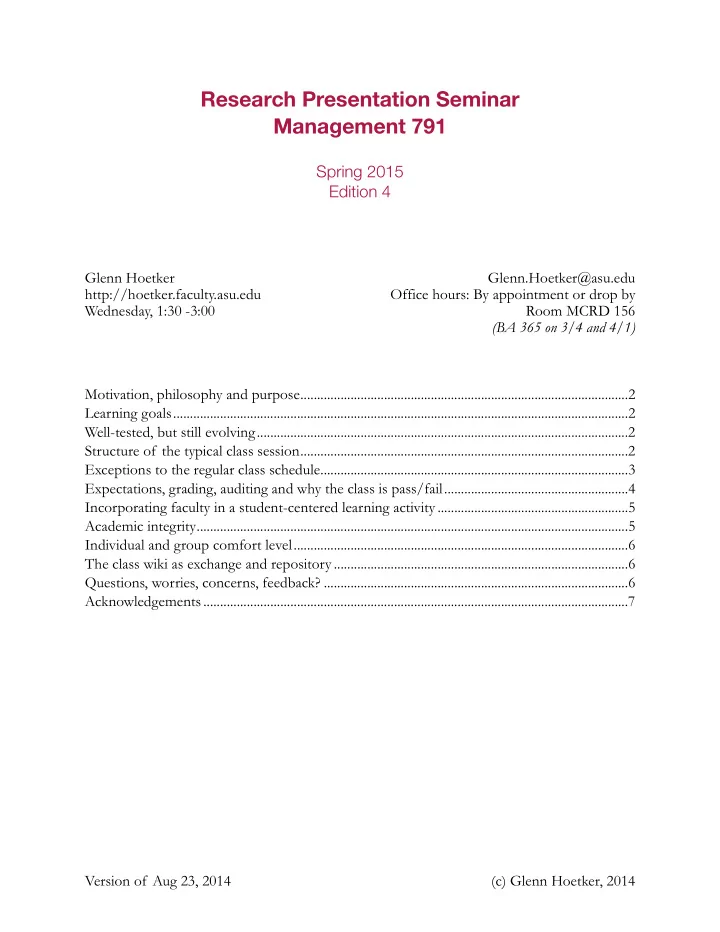

Research Presentation Seminar Management 791 Spring 2015 Edition 4 Glenn Hoetker Glenn.Hoetker@asu.edu http://hoetker.faculty.asu.edu Office hours: By appointment or drop by Wednesday, 1:30 -3:00 Room MCRD 156 (BA 365 on 3/4 and 4/1) Motivation, philosophy and purpose .................................................................................................. 2 Learning goals ........................................................................................................................................ 2 Well-tested, but still evolving ............................................................................................................... 2 Structure of the typical class session .................................................................................................. 2 Exceptions to the regular class schedule ............................................................................................ 3 Expectations, grading, auditing and why the class is pass/fail ....................................................... 4 Incorporating faculty in a student-centered learning activity ......................................................... 5 Academic integrity ................................................................................................................................. 5 Individual and group comfort level .................................................................................................... 6 The class wiki as exchange and repository ........................................................................................ 6 Questions, worries, concerns, feedback? ........................................................................................... 6 Acknowledgements ............................................................................................................................... 7 Version of Aug 23, 2014 (c) Glenn Hoetker, 2014
Motivation, philosophy and purpose M ANY OF US RESPOND LIKE Daffy in this picture when we think of public speaking. But, presenting our work is critical to being a suc- cessful management scholar. We can learn a lot by watching good pre- senters, but we learn more by presenting ourselves and getting honest, constructive feedback. So, this seminar is about learning by doing . This seminar will provide a safe, structured environment in which you can hone your ideas and your ability to present them. We’ll also prac- tice the craft of scholarly critique. The class requires serious engagement, but is structured so that the time commitment is largely limited to our class time. The anticipated outcomes include better research more effectively presented, more publica- tions and better career prospects. Many of the skills also translate directly to the classroom, which should make teaching easier and more rewarding. Learning goals The W.P. Carey School of Business has established the following learning goals for its PhD students: critical thinking, communication, discipline specific knowledge, and research meth- ods. While our activities will touch on all four goals, we will most directly practice communi- cation and critical thinking . Well-tested, but still evolving After a long and successful history at Berkeley, Illinois and Maryland, this will be the third edition of the seminar at ASU. We will build on the successes and lessons of the first two editions. An interesting challenge will be taking advantage of the more experienced students expertise, while keeping the class interesting and beneficial for everyone. I have some ideas in that direction and will be turning to you for thoughts. Structure of the typical class session The structure of the class period maximizes the “practice of presenting”. 1. Depending on the type of talk being practices, there will be one or two presenter per ses- sion. Presenting when your turn comes up is mandatory, but we’ll schedule collaboratively to match everyone’s preferences as best we can. The presenter clearly states at the begin- ning of the presentation what they want most out of the presentation–whether help in theory, in methods, brainstorming, R&R input, etc. Presentations can range from brain- storming about ideas/data, to pre-job market polished papers, to practicing presentations for conferences or other classes (with that professor's okay, of course). They needn't be 2
prepared specifically for the seminar — indeed, it's more useful if they aren't. Any man- agement topic is fair game. 2. The first block of time is a regular presentation, with comments/questions from students. I usually won’t speak up unless it is to ask for clarifications, or to step in on something that people are stuck on. I will take notes on my computer, which I will send to the presenter. 3. The next block of time is followed a “sandwich” of positive, crit- ical, and positive comments. These can discuss content, format, style, demeanor, you name it. I will usually take about 5-10 min- utes then shaping up the take-aways, providing them input based on the main points in my written notes, and tying comments to- gether from the students. The length of each block of time will depend on the type of presentation the presenter is practicing. For a job talk, the first block will be about 60 minutes and the second block the remaining 30 minutes. We’ll discuss other types of talks as needed. At a minimum, the presenter should provide a one paragraph abstract and the specifics of what they most want out of the presentation to the class at least two days in advance. When the presenter is far enough along to provide a paper in advance, he or she is encouraged to do so. Non-presenters are expected to have read the material provided before class and have some questions and/or feedback in mind. Exceptions to the regular class schedule There will be a few exceptions to the regular class schedule. • The first class period. No one will be expected to present. We’ll discuss class logistics and explore why we present, what makes a “good” presentation, the elements of useful feed- back, etc. Expect to be active and have fun. • The second class period. No meeting, in order to give the first speaker time to prepare. • In most weeks in which we have an external speaker, the post-presentation debrief led by Don Lange will take the place of our class meeting. I won’t attend the debrief—that’s your time to learn with Don—so it is your responsibility to help bridge the lessons from the two activities. Note that this will require some flexibility, as the schedule for external speakers can change on short notice. Give how many speakers we’ll have, we may have to meet some weeks we have a speaker. • As part of the evolutionary process, we may decide to devote a session to a related activity. If there is something you’d like us to address, please just tell me. 3
Recommend
More recommend